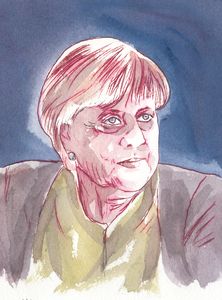Angela Merkel has just become German Chancellor for the fourth time. It has been a rough six months, but her strength is that she remains unflustered amid turbulence, uncertainties and setbacks. As coalition talks dragged on fruitlessly for months, Merkel was criticised, her leadership undermined, her authority questioned, her political obituary written. Nicknamed 'Mutti' or Mum and 'Mother Europe', Merkel was weakened. But she stayed the course. Six months after a fractured election verdict, she has finally, painstakingly formed a coalition, forged after significant sacrifices, concessions and appeasing fierce critics.
Merkel’s conservative Christian Democratic Union (CDU) was the single largest party in the elections last September. But it was the party’s worst performance since World War II. People blamed Merkel for her policies that led to a million migrants, mostly Syrian refugees, flooding Europe in 2015. That provoked many voters to flee to the anti-migrant, far right AfD (Alternative für Deutschland), now the third largest party and entering the German parliament, the Bundestag, for the first time.
Merkel's CDU and its sister party, the Christian Social Union (CSU), initially struggled for a coalition with the Green Party and the business-friendly Free Democratic Party. Talks collapsed due to the inherent contradictions. That left one choice—somehow woo the Social Democrats (SPD). Merkel’s CDU and SPD are Germany’s two main parties, but the SPD’s “grand coalition” partnership in the previous two Merkel governments alienated its traditional voters. They bled severely in the September elections, getting the least number of votes since World War II. They decided to sit in opposition and “reflect”.
But contemplation has no place in realpolitik. Europe’s powerhouse needed a government. The ongoing political paralysis was creating a policy vacuum and economic uncertainty. In a painful concession, Merkel gave up the finance ministry —always held by her party—to lure the SPD into the grand coalition. For the past eight years, the job was held by CDU’s Wolfgang Schaeuble, a divisive figure whose rigid emphasis on fiscal discipline in the European Union was admired in Germany and northern European countries, while loathed in debt-ridden southern countries. In an interview with the public broadcaster ZDF, Merkel acknowledged the anger in her party, saying “I understand the disappointment. After so many years in which Wolfgang Schaeuble held the finance ministry, himself becoming an institution, it was hard for many of us that we couldn’t hold on to that ministry.”
This job profoundly impacts the EU. The SPD is more kindly disposed to French President Emmanuel Macron’s reforms for the European Union, but the German establishment is likely to remain tough on Eurozone debt. Analysts concur the SPD got the better end of the deal. Julian Reichelt, editor of Germany’s biggest selling paper, Bild, tweeted: “This is the first SPD government led by a CDU Chancellor.” Merkel also accommodated party opponents. She rewarded party critic Jens Spahn with the health ministry. Said she: “We need to show we can start with a new team. We need to ensure that not only the over-60s are considered [for cabinet posts], but also younger people.”
Criticism of Merkel has turned to praise—for achieving generational change, reeling in her opponents and unifying her party. Acclaim or abuse, Merkel remains unflappable. Bitten as a child, Merkel is afraid of dogs. During a state visit to Moscow, President Vladimir Putin brought in his black Labrador, Konni, smirking while Merkel looked uncomfortable. But she sat through unruffled. Afterwards, she fired the ultimate put-down: “I understand why he has to do this—to prove he is a man. He is afraid of his own weakness.” It is a weakened Mutti who begins her fourth term with many challenges to tackle—terrorism, trade wars, Euro debt, migration, populism, anti-establishment movements. Germany and Europe needs Mutti’s steady hand.
Pratap is an author and journalist.


